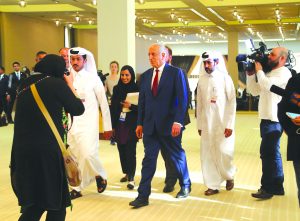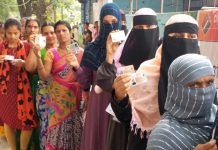 The peace deal signed in Doha (capital of Qatar) between the US and the Taliban (representing what they call the Islamic Emirate of Afghanistan) on February 29 has three main gainers. They include the Donald Trump administration, the Taliban and Pakistan, which may get the strategic depth it has been looking for. The US and the Taliban have got what they aspired for. President Trump wanted to show to the American public in this election year that he has fulfilled the promise he had made during the 2016 presidential polls: all the US soldiers in Afghanistan will be back home in 14 months from now. Thus, the US has got an honourable exit to save its resources and concentrate on economic growth, of course, without ignoring the security factor.
The peace deal signed in Doha (capital of Qatar) between the US and the Taliban (representing what they call the Islamic Emirate of Afghanistan) on February 29 has three main gainers. They include the Donald Trump administration, the Taliban and Pakistan, which may get the strategic depth it has been looking for. The US and the Taliban have got what they aspired for. President Trump wanted to show to the American public in this election year that he has fulfilled the promise he had made during the 2016 presidential polls: all the US soldiers in Afghanistan will be back home in 14 months from now. Thus, the US has got an honourable exit to save its resources and concentrate on economic growth, of course, without ignoring the security factor.
Trump has been of the view that the US has been spending enormously in terms of money and manpower to fight a war in Afghanistan which has very little to do with the Americans today. The Trump administration has, therefore, been feeling that Washington must get out of the Afghan war theatre, a political morass, at the first opportunity. So, finally, it has got an honourable way out.
The Doha deal signifies the Taliban’s victory over the US-led NATO because the former could not be destroyed by the sole surviving super power and its allies despite using all the resources they had, including their military and financial might. The deal upholds the Taliban stand that all the foreign troops stationed in their country to provide military backing to the Kabul regime must be withdrawn before any peace agreement could be signed. But this has happened because it also suits the US and its allies and owing to the commitment by the Taliban to shun the path of violence. When the Americans began to court the Taliban after realising that this ideologically inspired extremist movement could not be defeated, they wanted the Taliban to say goodbye to violence and become part of the ruling dispensation. The idea was that power, after all, comes with responsibilities and can have a sobering impact on those who wield it.
But the Taliban negotiators have succeeded in getting more. By signing the Doha deal with the US, the Taliban factions have emerged as the real representatives of the Afghan masses, though unelected. What comes out of the intra-Afghan talks, to be held in Oslo as agreed upon, however, is yet to be seen.
The third major gainer, Pakistan, has ultimately got an opportunity not only to satiate its hunger for strategic depth it had been looking for in Afghanistan but also to influence the course of governance through its powerful proxy, the Sirajuddin Haqqani group of the Taliban, if everything goes in accordance with the script prepared at Doha. The marginalisation of the Ashraf Ghani government at the hands of its own promoters, the Americans, suits Pakistan more than any other country in the South Asian region.
The situation that may emerge now will need to be closely watched in the interest of peace in the region. The proposed Oslo (Norwegian capital) dialogue must ensure that the tribal balance of power in Afghanistan is not disturbed. The Pashtun domination through the Taliban should not lead to ignoring the sentiments of the minority tribes like the Hazaras if the world wants that the Doha deal really brings about peace in the war-torn nation.
The Doha deal has come after months of negotiations intended to end the 19-year-long war. But one cannot be sure at this stage that it will result in peace and stability in Afghanistan. One has to keep one’s fingers crossed. The swapping of prisoners held by the Afghanistan regime and the Taliban must be accomplished in accordance with the arrangement made in the US-Taliban accord if the deal is to survive. This was the primary factor that led to the Taliban resorting to attacks at checkpoints manned by the Ashraf Ghani government’s security personnel soon after the signing of the deal. As expected, US troops promptly came to the rescue of the Afghan soldiers, but all that happened sent out disturbing signals — that the second stage of the peace negotiations planned in Oslo may get jeopardised if the Taliban and the Kabul regime do not show restraint at this critical juncture.
The US along with its NATO allies had invaded the Taliban-ruled Afghanistan in 2001 in the wake of the 9/11 terrorist attacks to finish off not only the Osama bin Laden-led Al-Qaida but also the local groups of extremists like the Taliban. The Pashtun-dominated Taliban not only survived but also gained more political and military muscle mainly because of the movement representing the aspirations of the Afghan masses. But the time has come when the Taliban will have to mend their ways if they really want peace and prosperity in their country.
The Taliban factions have agreed that they will not allow any territory of Afghanistan to be used for terrorist activity by any group, including the Al-Qaida and the Islamic State. Obviously, they feel emboldened with the successful conclusion of the first stage of the peace talks upholding most of their viewpoints. But now they need to conduct themselves in a manner so that extremist forces elsewhere in the region do not get a message that extremism pays.
Interpreting the Doha deal as a victory of extremism or majoritarianism will not be fair. The correct inference that can be drawn is that a process has begun for Afghanistan to be run by the Afghans, keeping in view the interests of all segments of society.
The marginalisation of the present ruling dispensation in Kabul should not be seen as a setback for liberal and peace-loving forces in Afghanistan. They have an opportunity to present their viewpoints forcefully when the intra-Afghan talks are held in Oslo. The Taliban leadership does not appear to be what it was in the late nineties when it ruled the country with an iron hand. Today it seems to have become conscious of the need of the hour — there is no better alternative to pursuing an internationally accepted policy of cooperative co-existence. It will also have to create an environment in which every section of society feels that it is everybody’s government that will be formed in Kabul after the Doha process begins to bear fruit.
India, which has financially and otherwise contributed a lot to the efforts for reconstruction of Afghanistan, needs to use the development-related role it has played after the formation of the US-backed elected government in Kabul to build bridges of understanding with the Taliban under the changed circumstances. India was represented during the signing of the Doha deal and this factor may help it find an opportunity to protect its interests in Afghanistan. But New Delhi’s strategy will have to be reformulated keeping in view the emerging reality in Kabul.
letters@tehelka.com













